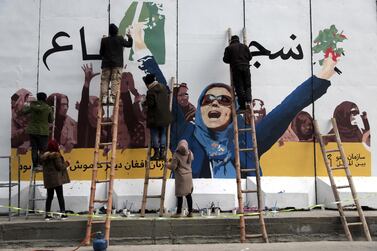The day she was flogged by members of the Taliban, Maryam was making her way to the local bazaar to shop for groceries – her face uncovered.
The 32-year-old housewife was born and raised in Afghanistan's Sancharak district in Sar-i-pul – a northern province, where the Taliban shadow police has tried for some time to return to.
“I was on my way to the city [centre] when we saw the Taliban coming," said Maryam, whose name has been changed to protect her identity. "Some people started to run, but I didn’t get the chance. One of them came up to me and three others and asked us: why aren’t you wearing a burqa?," she recalled, referring to the long garment imposed by the Taliban, which covers women from head to toe.
As quickly as they appeared, the men issued their verdict – Maryam and three other women were to receive 30 lashes for stepping out in public without a burqa. “I was speechless. I am not sure how many times I was lashed, I lost count after a while. The pain was too unbearable,” she said. Meanwhile, a crowd gathered to witness the impromptu trial.
According to local reports, however, a group of men stepped forward to stop the Taliban. While Maryam was unable to corroborate this, Zabiullah Amany, the governor's spokesman said that several male residents tried helping many of the women arrested by the Taliban.
"The Taliban wanted to lash the women, but people didn't allowed them," Mr Amany told The National. Unfortunately, Maryam and the three women were not among those who were rescued. According to him, they were accused of adultery and because of this, he implied, the local crowd was largely unsympathetic and did not help them like they did with the other women. Adultery is illegal in Afghanistan.
Maryam, however, insisted she was punished for not adhering to the strict Taliban dress code, which requires that women keep their faces covered at all times to preserve their modesty. “They lectured us about our duties. They told us you must cook food, you don't have permission to go to the doctor without a mahram. I am so angry and upset at the way I was treated,” she said, using the Arabic term for a male guardian.
Almost two weeks have passed and Maryam is still battling the physical and psychological trauma.
The Taliban is known to carry out public lashings, stoning, the amputation of limbs and hands and summary executions.
While these were fairly common in Afghanistan at the height of the Taliban rule in the late 1990s, several reports over the past few years indicate the group has continued to implement similar punishments in the areas they control. This is especially true for women they regard immoral.
Several reports from October 2018 allege that women in Jowzjan – a province that borders Sar-i-Pul – were flogged by local Taliban leaders for visiting the doctor in the absence of a male guardian and for using their mobile phones.
Similar reports were observed in other provinces, including Faryab, Nuristan and Ghor, the latter sparked global outrage, prompting a response from Afghan President Ashraf Ghani who called it a “heinous act”.
Despite these isolated episodes the Afghan legal system has evolved considerably since the fall of the Taliban in 2001.
But as the talks in Doha between the US administration and members of the Taliban move forward, some Afghans have expressed concern that the peace deal could impact the current system.
"I think we are seriously underestimating what Taliban will do to the constitution," women's rights activist Zuhra Bahman said. We will see a setback in seeking justice for women."
The Taliban have on several occasions expressed a need to amend the constitution. “The Kabul government constitution is invalid. It has been imported from the West and is an obstacle to peace. It is conflicted," Sher Mohammad Abbas Stanikzai, a Taliban leader, said during negotiations in Moscow last month. "We want an Islamic constitution.”
Like the brave men of Sar-i-pul, who reportedly put themselves in harms way to stand up for human rights, Ms Bahman urged more Afghans to come forward and “be vocal about the need for the constitution to be upheld”.
Laws, she said, should focus on reform and not the majoritarian view. "It’s the [Afghan] state’s duty to ensure that laws comply with human rights standards and obligations and avoid handing out torturous and in humane punishments.
We need a society that’s conducive to empowering men and women to take similar action.”






